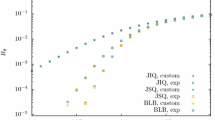Abstract
In this paper we consider a stochastic server (modeling a multiclass communication switch) fed by a set of parallel buffers. The dynamics of the system evolve in discrete-time and the generalized processor sharing (GPS) scheduling policy of [25] is implemented. The arrival process in each buffer is an arbitrary, and possibly autocorrelated, stochastic process. We obtain a large deviations asymptotic for the buffer overflow probability at each buffer. In the standard large deviations methodology, we provide a lower and a matching (up to first degree in the exponent) upper bound on the buffer overflow probabilities. We view the problem of finding a most likely sample path that leads to an overflow as an optimal control problem. Using ideas from convex optimization we analytically solve the control problem to obtain both the asymptotic exponent of the overflow probability and a characterization of most likely modes of overflow. These results have important implications for traffic management of high-speed networks. They extend the deterministic, worst-case analysis of [25] to the case where a detailed statistical model of the input traffic is available and can be used as a basis for an admission control mechanism.
Similar content being viewed by others
References
M.S. Bazaraa, H.D. Sherali and C.M. Shetty, Nonlinear Programming: Theory and Algorithms, 2nd ed. (Wiley, New York, 1993).
D. Bertsimas, I.C. Paschalidis and J.N. Tsitsiklis, On the large deviations behaviour of acyclic single class networks and multiclass queues, in: RSS Workshop in Stochastic Networks, Edinburgh, UK (1995).
D. Bertsimas, I.C. Paschalidis and J.N. Tsitsiklis, Asymptotic buffer overflow probabilities in multiclass multiplexers: An optimal control approach, IEEE Trans. Automat. Control 43(3) (1998) 315–335.
D. Bertsimas, I.C. Paschalidis and J.N. Tsitsiklis, On the large deviations behaviour of acyclic networks of G=G=1 queues, Ann. Appl. Probab. 8(4) (1998) 1027–1069.
J.A. Bucklew, Large Deviation Techniques in Decision, Simulation, and Estimation (Wiley, New York, 1990).
C.S. Chang, Sample path large deviations and intree networks, Queueing Systems 20 (1995) 7–36.
C.S. Chang and T. Zajic, Effective bandwidths of departure process from queues with time varying capacities, in: Proc.IEEE Infocom '95, Vol. 3, Boston, MA (April 1995) pp. 1001–1009.
C. Courcoubetis and R. Weber, Estimation of overflow probabilities for state-dependent service of traffic streams with dedicated buffers, in: RSS Workshop in Stochastic Networks, Edinburgh, UK (1995).
H. Cramér, Sûr un nouveau théoréme-limite de la théorie des probabilités, in: Colloque Consacré à la Théorie des Probabilités, Actualités Scientifiques et Industrielles, Vol. 736 (Hermann, Paris, 1938) pp. 5–23.
A. Dembo and T. Zajic, Large deviations: From empirical mean and measure to partial sums processes, Stochastic Process. Appl. 57 (1995) 191–224.
A. Dembo and O. Zeitouni, Large Deviations Techniques and Applications (Jones and Bartlett, 1993).
A. Demers, S. Keshav and S. Shenker, Analysis and simulation of a fair queueing algorithm, J. Internetworking: Res. Experience 1 (1990) 3–26.
G. de Veciana, C. Courcoubetis and J. Walrand, Decoupling bandwidths for networks: A decomposition approach to resource management, Memorandum, Electronics Research Laboratory, University of California, Berkeley, CA (1993).
G. de Veciana and G. Kesidis, Bandwidth allocation for multiple qualities of service using generalized processor sharing, IEEE Trans. Inform. Theory 42(1) (1995).
P. Dupuis and K. Ramanan, A Skorokhod problem formulation and large deviation analysis of a processor sharing model, Technical Report, Division of Applied Mathematics, Brown University (1997).
A.I. Elwalid and D. Mitra, Effective bandwidth of general Markovian traffic sources and admission control of high speed networks, IEEE/ACM Trans. Networking 1(3) (1993) 329–343.
A. Ganesh and V. Anantharam, Stationary tail probabilities in exponential server tandems with renewal arrivals, Queueing Systems 22 (1996) 203–248.
R.J. Gibbens and P.J. Hunt, Effective bandwidths for the multi-type UAS channel, Queueing Systems 9 (1991) 17–28.
P.W. Glynn and W. Whitt, Logarithmic asymptotics for steady-state tail probabilities in a singleserver queue, J. Appl. Probab. A 31 (1994) 131–156.
J.Y. Hui, Resource allocation for broadband networks, IEEE J. Selected Areas Commun. 6(9) (1988) 1598–1608.
F.P. Kelly, Effective bandwidths at multi-class queues, Queueing Systems 9 (1991) 5–16.
F.P. Kelly, Notes on effective bandwidths, in: Stochastic Networks: Theory and Applications, Vol. 9, eds. S. Zachary, I.B. Ziedins and F.P. Kelly (Oxford University Press, Oxford, 1996) pp. 141–168.
G. Kesidis, J. Walrand and C.S. Chang, Effective bandwidths for multiclass Markov fluids and other ATM sources, IEEE/ACM Trans. Networking 1(4) (1993) 424–428.
N. O'Connell, Queue lengths and departures at single-server resources, in: RSS Workshop in Stochastic Networks, Edinburgh, UK (1995).
A.K. Parekh and R.G. Gallager, A generalized processor sharing approach to flow control in integrated services networks: The single node case, IEEE/ACM Trans. Networking 1(3) (1993) 344–357.
I.C. Paschalidis, Large deviations in high speed communication networks, Ph.D. thesis, Massachusetts Institute of Technology (1996).
I.C. Paschalidis, Class-specific quality of service guarantees in multimedia communication networks, Technical Report, Department of Manufacturing Engineering, Boston University (June 1998); to appear in Automatica (Special Issue on Control Methods for Communication Networks).
A. Puhalskii, Large deviation analysis of the single server queue, Queueing Systems 21 (1995) 5–66.
R.T. Rockafellar, Convex Analysis (Princeton University Press, Princeton, 1970.
A. Shwartz and A. Weiss, Large Deviations for Performance Analysis (Chapman and Hall, New York, 1995).
A. Weiss, An introduction to large deviations for communication networks, IEEE J. Selected Areas Commun. 13(6) (1995) 938–952.
Z.-L. Zhang, Large deviations and the generalized processor sharing scheduling for a two-queue system, Queueing Systems 26(3/4) (1997) 229–264.
Author information
Authors and Affiliations
Rights and permissions
About this article
Cite this article
Bertsimas, D., Paschalidis, I.C. & Tsitsiklis, J.N. Large deviations analysis of the generalized processor sharing policy. Queueing Systems 32, 319–349 (1999). https://doi.org/10.1023/A:1019151423773
Issue Date:
DOI: https://doi.org/10.1023/A:1019151423773




